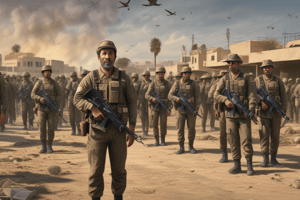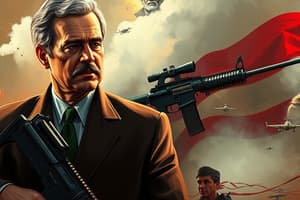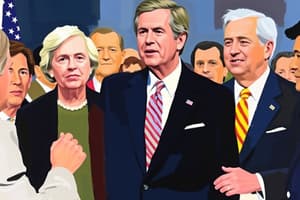Podcast
Questions and Answers
What major program did Bush support to stabilize banks during the financial crisis?
What major program did Bush support to stabilize banks during the financial crisis?
Bush's policies after the 9/11 attacks had no lasting impact on U.S. foreign and domestic security frameworks.
Bush's policies after the 9/11 attacks had no lasting impact on U.S. foreign and domestic security frameworks.
False
Which two Supreme Court justices did Bush appoint?
Which two Supreme Court justices did Bush appoint?
John Roberts and Samuel Alito
Bush rejected the ___________ Protocol, citing economic concerns over climate change.
Bush rejected the ___________ Protocol, citing economic concerns over climate change.
Signup and view all the answers
Match the following events with their impact during Bush's presidency:
Match the following events with their impact during Bush's presidency:
Signup and view all the answers
What lenses can Bush's presidency be summarized through?
What lenses can Bush's presidency be summarized through?
Signup and view all the answers
Bush's presidency is viewed unanimously positively by all historians.
Bush's presidency is viewed unanimously positively by all historians.
Signup and view all the answers
What was one of the criticisms related to Bush's economic legacy?
What was one of the criticisms related to Bush's economic legacy?
Signup and view all the answers
What was one justification for the invasion of Iraq during Bush's presidency?
What was one justification for the invasion of Iraq during Bush's presidency?
Signup and view all the answers
The USA PATRIOT Act expanded surveillance powers but was widely accepted with no criticisms.
The USA PATRIOT Act expanded surveillance powers but was widely accepted with no criticisms.
Signup and view all the answers
What was the primary goal of the Bush Doctrine?
What was the primary goal of the Bush Doctrine?
Signup and view all the answers
The ___________ was created in 2002 to consolidate agencies addressing domestic threats.
The ___________ was created in 2002 to consolidate agencies addressing domestic threats.
Signup and view all the answers
Match the following policies to their descriptions:
Match the following policies to their descriptions:
Signup and view all the answers
Which event in 2005 damaged Bush's reputation due to perceived weaknesses in federal response?
Which event in 2005 damaged Bush's reputation due to perceived weaknesses in federal response?
Signup and view all the answers
Bush's foreign policy approach was characterized by strong support for democracy promotion.
Bush's foreign policy approach was characterized by strong support for democracy promotion.
Signup and view all the answers
What controversial outcome resulted from the tax cuts implemented by Bush?
What controversial outcome resulted from the tax cuts implemented by Bush?
Signup and view all the answers
Study Notes
Bush Jr. (2001-2009) - Global Policies
- 9/11 and the War on Terror: The September 11th attacks significantly impacted Bush's presidency, defining his global agenda through the invasions of Afghanistan (2001) and Iraq (2003).
- Iraq War: Justification for invasion stemmed from claims of weapons of mass destruction (WMDs) and regime change. This led to protracted conflict, regional instability, and questions about U.S. intelligence practices.
- Bush Doctrine: Advocated for preemptive action to prevent threats before they materialized. This positioned U.S. foreign policy as a mission for spreading democracy and counter-terrorism.
- Global Democracy Promotion: The effort to spread democracy, particularly in the Middle East, was intended to enhance global security. Outcomes were mixed, with progress in some areas and criticisms regarding naivety and overreaching.
- Key Relationships: Strong alliances with the UK, especially under Tony Blair, but strained ties with nations opposing the Iraq War (e.g., France and Germany). Increased support for Israel and a focus on Middle Eastern geopolitics were also key features.
- Creation of the Department of Homeland Security (2002): This consolidated agencies to combat domestic threats following 9/11.
Bush Jr. (2001-2009) - Domestic Policies
- USA PATRIOT Act (2001): Expanded surveillance and law enforcement powers to counter terrorism, though controversial for perceived infringements on civil liberties.
- Tax Cuts: Major tax cuts in 2001 and 2003 aimed at economic stimulation. Critics argued they benefited the wealthy disproportionately and increased national debt.
- No Child Left Behind (2002): Public education reforms focused on standardized testing and accountability. Critics cited the added burden on schools and teachers.
- Medicare Prescription Drug Benefit (2003): Expanded Medicare coverage to include prescription drugs. Considered significant but criticized for cost and lack of price controls.
Bush Jr. (2001-2009) - Themes and Impact
- Leadership During Crises: 9/11 galvanized national and global support for Bush, but Hurricane Katrina (2005) revealed weaknesses in federal disaster response, damaging his reputation.
- Religious Influence: His Christian faith profoundly shaped his rhetoric and policies, appealing to evangelicals. However, this also raised concerns regarding the separation of church and state.
- Economic Challenges: The start of his term saw a recession, followed by the 2008 financial crisis. The Troubled Asset Relief Program (TARP) was enacted but sparked significant debate about government intervention.
- Environmental Policies: Rejection of the Kyoto Protocol demonstrated a priority on economic concerns over climate change, with support given to domestic energy production.
- Polarization and Public Perception: Bush's policies and rhetoric exacerbated political divides. Approval ratings fluctuated, peaking after 9/11 and declining following Iraq, Katrina, and the financial crisis.
- Shaping Global Security: Policies related to the war on terror notably impacted U.S. foreign and domestic security frameworks, triggering ongoing debates about the effectiveness and ethics of preemptive war.
- Judicial Appointments: Bush appointed two conservative Supreme Court justices (John Roberts and Samuel Alito), impacting the judiciary's direction.
- Economic Legacy: Tax cuts and financial crisis interventions were significant policy debates. Deficits and inequality during his tenure were a recurring concern.
- Middle East Relations: Actions in Iraq and Afghanistan significantly shaped the region’s realities, although long-term consequences and outcomes remains a major debate and source of controversy.
- Public Perception: Critiques of his presidency often focused on overreach, mismanagement, and unintended consequences, despite considerable support from some segments of society.
Studying That Suits You
Use AI to generate personalized quizzes and flashcards to suit your learning preferences.
Related Documents
Description
Explore the key global policies of President George W. Bush during his administration from 2001 to 2009. This quiz covers significant events such as the War on Terror, the Iraq War, and the Bush Doctrine, as well as the promotion of democracy worldwide. Test your knowledge on the impacts these policies had on international relations and security.




